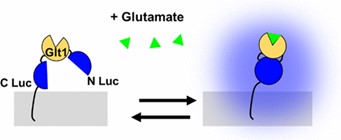E. Petersen Research
 Research in the Petersen Lab focuses on the development of genetically encoded tools using rational protein design and protein evolution. The tools we are developing can be used to either report or control cell signaling and neuronal activity based on events within a cell or the presence of various neurotransmitters. We aim to apply these tools to study brain function in health and disease and to correct the underlying pathologies of various neurodegenerative diseases. In addition to neuroscience applications, we are developing various protein-based biosensors and synthetic gene circuits for a variety of biomedical application including inflammation, cell growth and cell signaling. We then apply these tools to various translational animal models including cancer, inflammation, neurodegeneration and neuro injury such as Alzheimer’s disease, Parkinson’s disease, stroke and spinal cord injury.
Research in the Petersen Lab focuses on the development of genetically encoded tools using rational protein design and protein evolution. The tools we are developing can be used to either report or control cell signaling and neuronal activity based on events within a cell or the presence of various neurotransmitters. We aim to apply these tools to study brain function in health and disease and to correct the underlying pathologies of various neurodegenerative diseases. In addition to neuroscience applications, we are developing various protein-based biosensors and synthetic gene circuits for a variety of biomedical application including inflammation, cell growth and cell signaling. We then apply these tools to various translational animal models including cancer, inflammation, neurodegeneration and neuro injury such as Alzheimer’s disease, Parkinson’s disease, stroke and spinal cord injury.
View Eric Petersen's recent publications
Current projects
Neurotransmitter sensors
Our lab is currently working to develop a variety of genetically encoded neurotransmitter sensors based on bioluminescent light emission. We are using these sensors to record activity based on specific neurotransmitters and report activity within deep brain regions of rodents.

Cell signaling
We have several ongoing projects that focus on reporting cell signaling events based on receptor activation or kinase activity. These include responding to hormone signaling, cell growth and regulation signaling. These Bioluminescent Kinase Sensors (BlinKS) emit light in the presence of these cell signaling events.
.jpg?Status=Master&sfvrsn=591423be_5)
